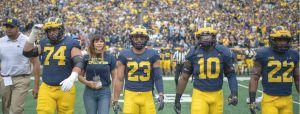Leavitt: Would paid college athletes be better citizens?
By Irv Leavitt for Chronicle Media — November 6, 2019
Brenda Tracy (third from left) founded Set the Expectation, an Oregon-based organization fighting sex crimes by athletes. She said paying college players for endorsements would make the situation worse. (University of Michigan Football photo)
Major college sports are slave systems run by a bunch of jerks. Many of their players are, unsurprisingly, also jerks.
Will the NCAA’s promise to get them paychecks make them less jerky? Or make them worse?
College football and basketball players are about three times more likely to commit a campus rape as their less-athletic fellow male students. That’s saying something, because there are an awful lot of campus sex assaults — reportedly affecting one in five college women. The players are also more likely to commit other crimes, such as beating people to pulps.
It may not be surprising, then, what my first thought was after the NCAA initiated a 14-month process to build a matrix to allow players to get paid for endorsements.
I hoped the result would make the players at least a little less prone to criminality. After all, their marketability is likely to depend on their character.
Dream on, Chicago sports lawyer Scott Andresen said.
“These are young, impetuous kids with a forward vision of about six inches,” he said. “They have a sense of invincibility, entitlement. When you’ve had every coach, parent, friend kissing your butt since you were 10 years old, that can lead to some unfortunate conduct.”
Diana Newton, who for eight years ran Porchlight Counseling Services, an organization assisting campus rape victims, said she has more confidence that money talks.
“Moral leadership … we’ve tried that,” said Newton. “If you have another deterrent — money — I think it would change behavior.”
“You’ve got to hit somebody where it hurts,” she said. “Financially. Look at DUI’s. They didn’t start going down until it started costing about $10,000 to get out of one,” said Newton, now leading Women and Children’s Horizons in Kenosha, Wisconsin, which also serves sexual violence victims.
Brenda Tracy, a “survivor activist” fighting athletes’ sexual assaults, said that endorsements are likely to give authorities a new reason not to believe women’s claims of assault. They may, she said, generate claims they’re gold-digging.
“Endorsements will make these things worse,” said Tracy, raped by two Oregon State football players and two other men in 1998. “The more elevated the athletes are, the worse decisions the school makes. It would be adding another layer of invincibility to the athlete.
“Not to mention the sense of entitlement. Right now, they’ve got a tutor in the building, someone to wake them up, and someone else to make sure all their food is there. Now let’s give them some commercials so they can make some money,” said Tracy, founder of Set the Expectation, an organization combating athlete sex crimes.
Endorsements might make the rich get richer, said Scott Kirkpatrick, a sports agent specializing in Olympic athletes. Big schools with broadly televised games may be the ones with the best endorsement possibilities. Those are some of the same schools where student athletes’ behavior has gotten out of hand.
Endorsements could also slow recruitment at schools where the extra-athletic opportunities are fewer.
Depending on what the NCAA creates, however, student athletes may enjoy a range of new remunerative possibilities ranging from national commercials down to appearances at a campus pizza joint, players selling their names and images to a video game producer, or coaching kids in the offseason, using their names as a selling point.
The Illinois General Assembly, at this writing, is working on a bill to provide endorsement rights regardless of the NCAA’s activities. California has already passed a law.
But the players probably won’t make any money from any of the changes if they tarnish their reputations.
“Every time a celebrity of any kind behaves poorly, it always makes people wonder about whether a celebrity endorsement is the right way to go,” Kirkpatrick, of Chicago Sports and Entertainment Partners, said.
“’Is it the right way to market our company, is the behavior a negative value to the company, the customers and the perception of our customers?’ That’s why every single agreement has morals clauses.”
Kirkpatrick doubted that injecting money into the equation would be a criminality disincentive.
“Those athletes predisposed to criminal activity won’t all of a sudden change according to whether or not they may be able to make revenue from a sponsor,” he said.
Some of the athletes may be set up to fail, Andresen said.
“We’re seeing sexual assault, domestic violence,” he said. “You tell these kids to go out there and kill, kill, kill, and then turn it off. A lot of them can’t do it.”
The coaching staffs, which have not exactly been world-beaters in controlling their players’ off-field urges, may be just as unlikely to communicate the economic realities of sponsorship, Andresen said.
“You’ve almost got to proactively pound it into their skull, and teach them to walk away, stay out of trouble,” he said. “If there’s a party where you know there will be some issues, don’t even go. You almost have to be that angel 24-7.
“An agent or lawyer has the best opportunity to do that.”
That last sentence, though self-serving, actually makes sense. If an agent is getting a cut of an endorsement, it’s in his or her interest to make sure it doesn’t go south.
Now if only we could give some agents a reason to watch over college fraternities.







